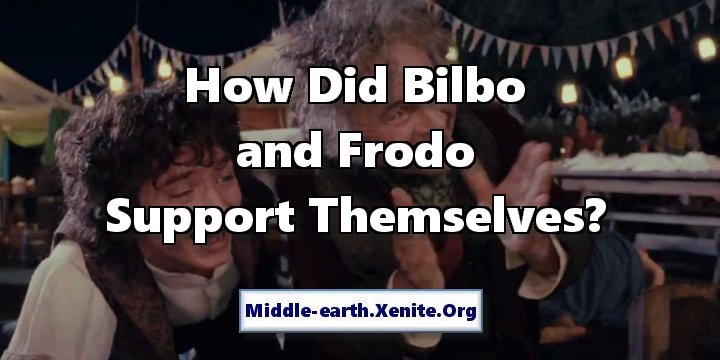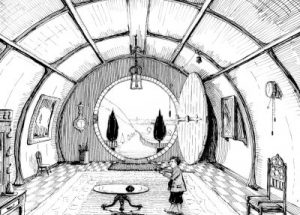
Q: How Did Bilbo and Frodo Support Themselves?
ANSWER: One word – plastics. Sorry, wrong movie. There is no precise, canonical description of the source of Bilbo and Frodo’s wealth (from their family), other than the treasure Bilbo brought back with him to the Shire. And according to Frodo he gave most of that treasure away.

Some people assume that Bilbo was a land-owner and must have supported himself from the proceeds (perhaps rents) of whatever his land was used to do. The Baggins of Bag End probably owned The Hill, which could mean that the Gamgees and their neighbors were rent-paying tenants but I always had the impression that the Gamgees worked for the Baggins of Bag End, and so they may have been residential servants, not tenants.
Otho Sackville-Baggins owned a fair amount of land that he left to his son Lotho. With financing from Saruman Lotho added to his holdings (according to Farmer Cotton) by buying farms, mills, ale-houses, and other property across the Shire. So we can infer from Lotho’s investment activity that property and business both could be bought and sold (although Frodo’s sale of Bag End to Lobelia also confirms this).
Bungo Baggins (Bilbo’s father) laid down bottles of wine (Old Winyards from Southfarthing) in Bag End. Did Bungo own the vinyard or trade in wine?
The Hobbit seems to imply that Bilbo owned the meadows he could look out upon between his garden and the river (the Water), but that may just be a trick of wording. Still, the wealthier hobbits were supposedly modeled on Victorian aristocrats and even farmers like the Cottons and Maggots owned land, so what could set Bilbo apart from other hobbits such that he was considered “wealthy”?
I doubt Tolkien would have attempted to engineer a complete economic blueprint for the Shire but his underlying assumptions may have been that the wealthiest hobbits “worked deals” for land and commodities. They would not have done the work of business owners (such as farming the land, milking the cows, taking goods to markets). More likely I think they would have bought and sold things in quantity and arranged for their disposal through functionaries or factors.
In other words, the wealthy hobbits probably financed business deals as investors. Occasionally they might buy a whole business or a parcel of land, which they could then own or sell as required.
Someone like Bilbo might have the means to buy a quantity of things grown or made in another part of the Shire for sale in and around Hobbiton and Bywater (not to mention the presents he brought in from Dale and Erebor to give away at his farewell party). This might include anything from ponies to rope to pottery to wine to tobacco. The local aristocrat probably controlled most of the local trade, taking his profits from the transactions and hiring local workers to handle the details.
Larger families like the Tooks and Brandybucks, who still resided together, may have worked their properties like family or clan estates, selling goods and special foods to local villagers and other wealthy families. Such a system would allow many families to own their own land and support themselves through limited trade but would ensure that long-distance trade was handled under the auspices of only a few.
Lotho became exceedingly wealthy by hobbit standards because he sold a lot of food and commodities to Isengard (Saruman), exporting as much as he could from the Shire (and depriving the hobbits of much of their own goods). The situation in the Shire seems grim when Frodo and his companions return but I think Tolkien meant to convey that Saruman just sucked the Shire dry of whatever he could, at first to support his war against Rohan and later out of pettiness and spite.
Hobbits who could raise their own food would have a chance to survive despite whatever was seized by the ruffians. But hobbits living in the villages (the tradesmen and workers) must have been completely dependent upon patronage from Saruman’s ruffians. After they just started taking whatever they wanted the working hobbits would have been impoverished.
In one of his letters Tolkien noted that hobbits had no ambition for greed or wealth, so it seems incongruous to assume that many of them would be like Lotho. But if Bilbo and Frodo were wealthy landowners they must have relied upon rents from farmers and shepherds who used those lands to support themselves and their families. But Tolkien says nothing about where the wealth came from. Nor does he suggest how hobbits defended their wealth. There are no banks in the Shire. When Frodo sold Bag End what did he do with the payment? Did he send it off in a cart along with the furniture he kept?
Although rarely mentioned in the stories money was certainly used in the Shire and elsewhere. Bilbo even gave away copper pennies to hobbit children, so it must have been fairly common. The use of money implies that a sizable population of specialist workers existed: merchants, craftsmen, laborers, and other skilled professions must have existed in the Shire, Buckland, and Bree. These specialists would create the demand for the foods and goods produced by the small farms and great estates. The Shire could not exist as a wholly closed economy (Tolkien understood that) but it seems to have been painted with broad strokes of self-sufficiency subtly clouded by the vague business dealings of the wealthy.
We know these trades happened because of the handful of anecdotes Tolkien used to embellish the details of the Shire, but we don’t know how often they happened or how significant they were. I think Tolkien would have understood that the deals would have been substantial and continuous, happening on an almost calendaric basis. In fact, many of the deals would have been annual activities driven by agriculture. Hides, wool, slaughtered meats, wines, and virtually anything that local farmers could not produce in sufficient quantities to support themselves and the villages would have been “brought in” by the wealthy families or their agents or business partners.
The hobbits’ wealth, however, does not appear to have been concentrated in the heads of the families. Tolkien does not represent the Shire system quite the same as the English system of the 1800s. He in fact rules out primogeniture (by which the majority of a family’s wealth was retained and managed by its head, the heir of the previous lord). In the English system the process of dividing wealth among heirs was complicated and discouraged. There is no mention of entailment (the concentration of family wealth in a single heir) or disentailment (the transfer of wealth to multiple or secondary heirs instead of the primary heir)
See also
Where There Banks in Middle-earth?
Are There Taxes in Middle-earth?
Is there Money in Middle-earth?
The Merchants of Middle-earth (Classic Essay)
What Would Shire Coins Look Like?
# # #
Have you read our other Tolkien and Middle-earth Questions and Answers articles?

I think that Shire must have also had traded with Bree-land and dwarves of Ered Luin. Butterbur mentions their shortage of leaf once ruffians take over and locals must have relied on local production of Southlinch and dwarves must have made extensive trade for food and whatever else they needed, seeming how Thorin considered hobbits as food-growers the remaining two clans of Firebeards and Broadbeams, and the Longbeards under Thorin’s leadership in blue Mountains must have need of large store of food, I wonder whether the travelling dwarves also did not brought some goods to the Shire from other lands, in The Hobbit we see that Bilbo gives coffee to his guests, how did he get it if not from trade? Pipe weed was grown locally but coffee?
Now this also reminds me of this quote 🙂 hehe
“All the same, I should like it all plain and clear,” said he obstinately, putting on his business manner (usually reserved for people who tried to borrow money off him)…”
There is also curious case which seems to imply that maybe dwarves could also loan money:
“Altogether those were good days for us, and the poorest of us had money to spend and to lend, and leisure to make beautiful things just for the. fun of it, not to speak of the most marvellous and magical toys, the like of which is not to be found in the world now-a-days.”
Enough money to spend and to LEND hehe indeed maybe they borrowed money for profit though maybe on fair terms hehe. What do you think?